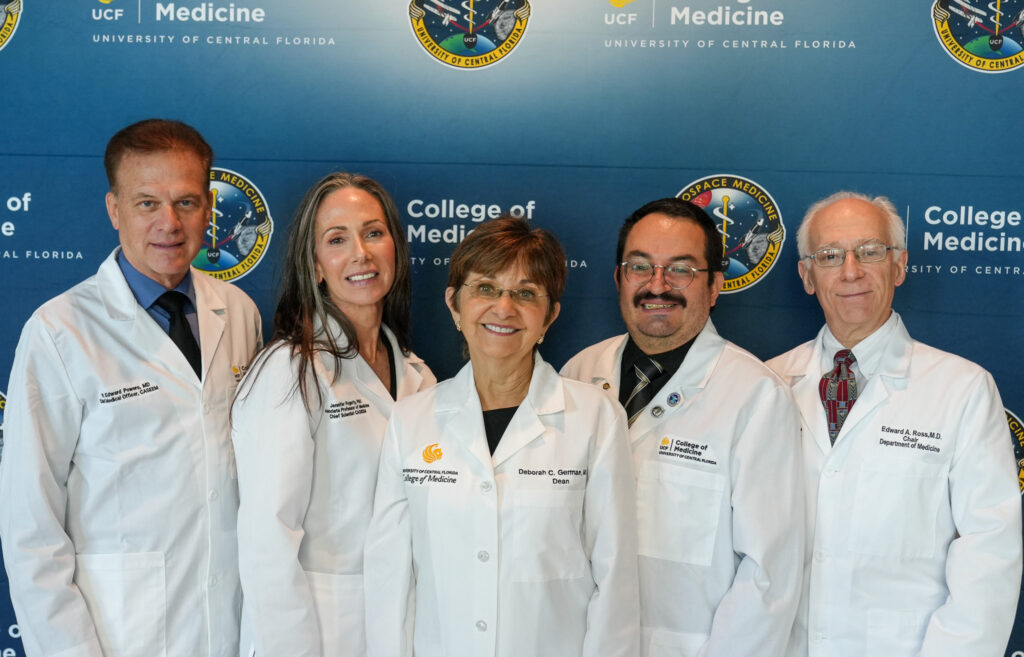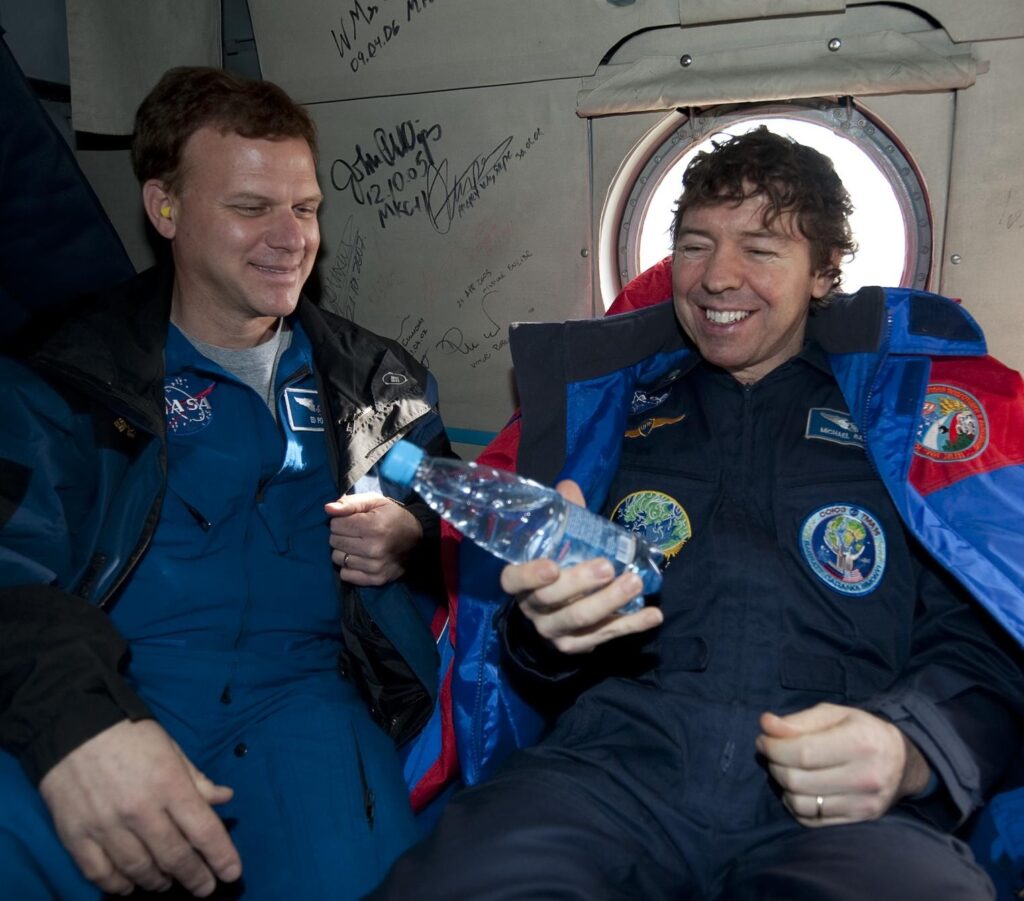
As part of that effort, two internationally known aerospace medicine experts recently joined the medical school’s faculty as part of a new UCF center that will lead research and technology development for improving health in extreme environments such as space.
Dr. William (Ed) Powers joins UCF after serving as director of flight medicine for Axiom Space and former chief of NASA’s Medical Operations Branch, where he was the primary medical support physician for six shuttle missions and four Soyuz missions launched from Kazakhstan to the International Space Station.
Dr. Jennifer Fogarty was chief scientist for NASA’s Human Research Program, where she led efforts to reduce the health risks of space travelers, including those traveling to Mars.
The two are part of the leadership of UCF’s new Center for Aerospace and Extreme Environments Medicine (CASEEM), serving as chief medical officer and chief scientist, respectively. The multidisciplinary center includes UCF faculty experts in medicine, engineering, computer science, psychology, arts, and educational leadership who will work together to research and develop new technologies for keeping space travelers healthy as well as soldiers on military missions, deep sea explorers, and mountain climbers.
“UCF is assembling a team of superstars to create a program that will allow us to harness knowledge obtained in space to solve our problems here on Earth,” says Dr. Deborah German, UCF’s vice president for health affairs and College of Medicine dean. “We will also be training future generations to continue this quest.”
UCF Center Is Most Interdisciplinary in Space Industry
The new center is led by Dr. Emmanuel Urquieta, the College of Medicine’s vice chair for aerospace medicine. An internationally recognized space medicine expert, Dr. Urquieta joined UCF in 2024 to expand research into how spaceflight affects humans and create a space medicine curriculum for students across the university.
He says UCF’s location near the Kennedy Space Center and the opportunity to collaborate in research and education across 12 colleges are major assets in making the university a recognized leader in space medicine.
“There couldn’t be a better location to study the health effects of human space flight,” he says.
Those discoveries also could help patients on Earth. For example, technologies developed to protect astronauts from radiation could help cancer patients receiving radiation therapy. Understanding how space travel advances aging and inflammatory processes in the body could uncover new anti-aging therapies.
Dr. Urquieta called the new UCF center “more interdisciplinary than any other in space industry.” There, UCF faculty physicians will work with engineers and computer scientists to create and test new technologies to diagnose and treat health problems in the confines of space and other extreme environments. Psychology faculty will help identify solutions to the mental health implications of space travel, including isolation and living in a confined area. Leadership science researchers will identify the best ways to select and train astronaut teams for optimum effectiveness.
Dr. Urquieta says the new UCF technologies will also be relevant to the military and can help improve access to healthcare in remote and isolated areas across the globe.
New M.D. Faculty Completed Residency Training at Orlando Health
Dr. Powers has master’s and bachelor’s degrees in biomedical engineering and has guided multiple research projects for commercial space medicine with the Federal Aviation Administration (FAA). He led the aerospace medicine residency program at the University of Texas Medical Branch and is a Fulbright Scholar. An emergency medicine physician, he did his residency training at Orlando Health, where he served as chief resident.
As a NASA physician, he supported six space shuttle missions including STS 135, the final flight of the Space Shuttle Program.
“I stood on the landing strip, and I was able to climb on board Atlantis right after they landed,” he says. “It was quite a memorable experience to close out the space shuttle program in that way.”
Dr. Powers also was a physician who supported American astronauts launching on Russian spacecraft. He participated in astronaut training and even spent 14 days in quarantine with the astronauts before they launched out of Kazakhstan. The astronauts were in space for six months and Dr. Powers helped them get medically acclimated to life back on Earth.
He recalls loading astronaut Mike Barratt onto a Russian helicopter after he landed.

“I handed him a bottle of water, and he sat there and stared at it because (in zero gravity) he hadn’t seen water go to the bottom of a bottle for about six months,” Dr. Powers says. He just kept staring and said, ‘Wow, that’s amazing.’”
Dr. Powers was in SpaceX mission control when Axiom Space launched the very first all private manned space mission to the International Space Station in 2022. He supported two additional all private missions for Axiom, serving as the lead flight surgeon for the Ax3 mission.
Dr. Powers says he first became interested in space flight at age 15, when he started taking flying lessons. In his new role at UCF, he will conduct FAA medical clearance exams for private and commercial pilots at the UCF Health Faculty Physician Practice. He says he believes UCF is well positioned to be a leader in space medicine and research.
“The platform of commercial space exploration is in its infancy now, but it’s really the way of the future,” Dr. Powers says. “Commercial spaceflight planners need expertise in how to deal with humans in the extreme environment of space flight. We can provide that for them.”
The Health Risks of Space Travel
The space industry recognizes the exposures that occur during space travel — including reduced gravity, isolation, confinement and radiation exposure — that may have negative health and performance impacts during and after a mission. Before coming to UCF, Dr. Fogarty spent 17 years researching those risks and how to prevent and mitigate them.
At NASA, she was the clinical translational scientist with Medical Operations Division and subsequently, chief scientist of the Human Research Program, where she managed a $145 million research budget dedicated to reducing the health and performance risks associated with expeditionary space travel such as the Mars mission. She also served as chief scientific officer and a faculty member with the Translational Research Institute for Space Health at Baylor College of Medicine, which focuses on developing innovative solutions for those risks.
NASA and international partner astronauts undergo rigorous medical screening before and monitoring after spaceflight missions. As commercial spaceflight expands, more civilians, with more varied medical histories, will live and work in space. So the space industry will need to have new technologies to handle medical situations at times when a trained physician is not onboard and in the small austere confines of a space capsule.
“When you put people into space and their life is unfolding, and unpredictable health issues emerge as they do, how are we prepared to handle that?” Dr. Fogarty says. “Those people will not have access to the robust healthcare resources that we have on Earth.”
“For example, cardiovascular disease is still the number one killer of people on Earth,” she continues. “The question came up while at NASA about putting astronauts on cholesterol management pharmaceuticals like statins. Well that seems reasonable to manage cholesterol and get cardiovascular risks low. But statins have side effects, and it would be very unfortunate to have a bad side effect when someone’s in space.”
Dr. Fogarty says she has always been fascinated by science and medicine since she was a child and was inspired by relatives’ careers as physicians and nurses.
“I always loved being out in nature, observing, playing and conserving,” she says. “They have a picture of me from when I was about 3 with my pockets full of frogs.”
Space exploration and the sacrifices made were always a source of inspiration. She saw the Challenger explode on TV as a youngster and was a postdoctoral researcher at Kennedy Space Center during the Columbia accident. She says those experiences have solidified in her the promise and the dangers of space flight. Dr. Fogarty says she is thrilled to be at UCF, where she can work with university leaders to create a nationally recognized center for aerospace medicine and technology development.
“We’ve had the International Space Station for over 20 years and have had on the order of 100 people living and working in space. Now as commercial space ramps up, thousands are projected to go into space and be productive workers for different agencies, companies or countries,” she says. “I believe UCF will be a strong part of that ecosystem enabling research and operational support and providing occupational health knowledge and care.”